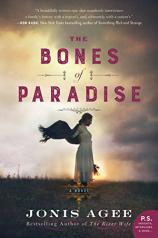The Bones of Paradise
Review
The Bones of Paradise
On December 29, 1890, one of the most atrocious massacres perpetrated by whites in American history occurred on the Lakota Pine Ridge Indian Reservation in South Dakota. Nearly 300 unarmed Sioux men, women and children were gunned down in their teepees by the U.S. Seventh Cavalry. For weeks leading up to the event, members of the Native American tribe had been performing a ritual “ghost dance” --- a spiritual ceremony to please the gods, entice the buffalo to return, and usher in a new era of prosperity on the reservation. Mistakenly assuming the dance meant that the Sioux were planning to attack, white soldiers invaded their camp and slaughtered them mercilessly and without warning.
It is against this backdrop --- but 10 years later in neighboring Nebraskan Sand Hills territory --- that Jonis Agee’s latest novel, THE BONES OF PARADISE, takes place. Filled with rich, historically accurate details defining the exploration of the American West and a brisk style of storytelling that keeps readers going at a steady clip, the book is both immersive and informative. It’s not hard to imagine the hardscrabble life our country’s first homesteaders had to forge --- and the suffering Native Americans were forced to endure because of it.
Agee structures the story as a gruesome murder mystery. In the book’s opening pages, a well-respected and stoic rancher named J.B. Bennett is killed just at the edge of his 20,000-acre plot of land. Moments before his death, he stumbles upon the sunburned, half-buried body of a young Sioux and dismounts his horse to find out who the dead girl was. Just before he’s lethally shot, he hears the cocking of a revolver, turns around, and says to an unknown figure, “Oh, it’s you.”
"Filled with rich, historically accurate details defining the exploration of the American West and a brisk style of storytelling that keeps readers going at a steady clip, the book is both immersive and informative."
In true whodunit fashion, Agee doesn’t reveal the assassin’s identity until much later in the book, nor does she explain who shot Ry Graver --- the down-and-out cowboy who discovers J.B.’s body --- or how J.B. and the dead girl are connected. Instead, Agee spends the first half of THE BONES OF PARADISE jumping back and forth through time, unspooling J.B.’s complicated, bittersweet past and the people who played a role in --- and often interfered with --- his life.
In one of the novel’s two major threads, we meet Drum, J.B.’s father --- a cranky codger townsfolk aptly nicknamed “Old Bastard.” Drum owns the ranch adjacent to J.B.’s and assumed guardianship of J.B.’s eldest son, 19-year-old Cullen, when the boy was just an adolescent. Drum and J.B. never got along, and for prickly reasons that don’t become clear until later, Drum was also responsible for the departure of J.B.’s wife, Dulcinea, 10 years prior to J.B.’s death.
When she leaves the ranch, Duclinea tries her best to steer clear of her husband --- except when she permits herself to remember the myriad reasons why she married him. Finding solace in motion, she takes up residence in Babylon, Cody, Rushville and Rosebud --- towns far enough away from Drum for him to inflict more damage but close enough to occasionally reconnect with J.B. and her youngest son, now 15-year-old Hayward. After J.B.’s murder, Dulcinea returns to track down his killer and hires a slick lawyer named Percival Chance to secure the deed to her old homestead.
In the novel’s second thread --- one seamlessly intertwined with J.B. and Dulcinea’s saga --- Agee reveals more about the dead Sioux girl, Star, by introducing readers to Star’s fierce and cunning sister, Rose. A colleague of Dulcinea’s at the Rosebud Reservation School, Rose accompanies Dulcinea to J.B.’s ranch to investigate Star’s murder and to exact revenge for the massacre at Wounded Knee, where her mother and friends died and an event she believes J.B. had some hand in.
Without giving too much away here, it’s safe to say that Agee keeps readers guessing as to who the murderer --- or murderers --- might be. Even as the mystery becomes clear, Agee plants others in return: Just who is Percival Chance, really, and does he have Dulcinea’s best interests at heart? Did J.B. really take part in the Wounded Knee killings, or was he just an innocent bystander? What is Ry Graver’s role in the mess, and are the Bennett boys really as blameless as they initially seemed? Finally, is Drum Bennett the greedy, unfeeling menace many perceive him to be, or was he motivated to cause a fissure between his son and Dulcinea for deeper, more compassionate reasons?
In addition to throwing in a few curveballs to keep the storyline taut and gripping, some easily anticipated and others harder to see coming, Agee infuses the narrative with historical touches to give it depth and relevance. The school where Dulcinea and Rose both served as teachers is a chillingly accurate replica of many of the schools available to Native Americans during that time --- strict boarding institutions that removed Indian children from their families and traditions in order to “teach them how to be good [Christian] citizens, how to follow rules, and about the consequences of poor decisions.”
Also of note is the question of whether Duclinea should cede J.B.’s ranch to prospectors interested in retaining it for mineral and oil rights --- a dilemma many struggling Western farmers and ranchers still grapple with to this day.
Above all, THE BONES OF PARADISE, though fiction, is a stark reminder of the brutal violence committed in the name of religion, progress and greed in the days of Western expansion. Aside from being a thrilling epic with a final 100 pages that pack a wallop of a punch (hint: two deaths; a fake funeral; a blooming romance; and an explosive finale involving a showdown, an admittance of guilt and a bittersweet resolution), it’s a moving tribute to early frontiersman chasing a dream and “Indians who spoke only of living in peace with creation again, without war and hunger, [and in] a world where their children could return to their families and be raised in the traditional ways in harmony with the animals and all people.”
Reviewed by Alexis Burling on August 5, 2016
The Bones of Paradise
- Publication Date: July 25, 2017
- Genres: Fiction, Historical Fiction
- Paperback: 448 pages
- Publisher: William Morrow Paperbacks
- ISBN-10: 0062413481
- ISBN-13: 9780062413482





